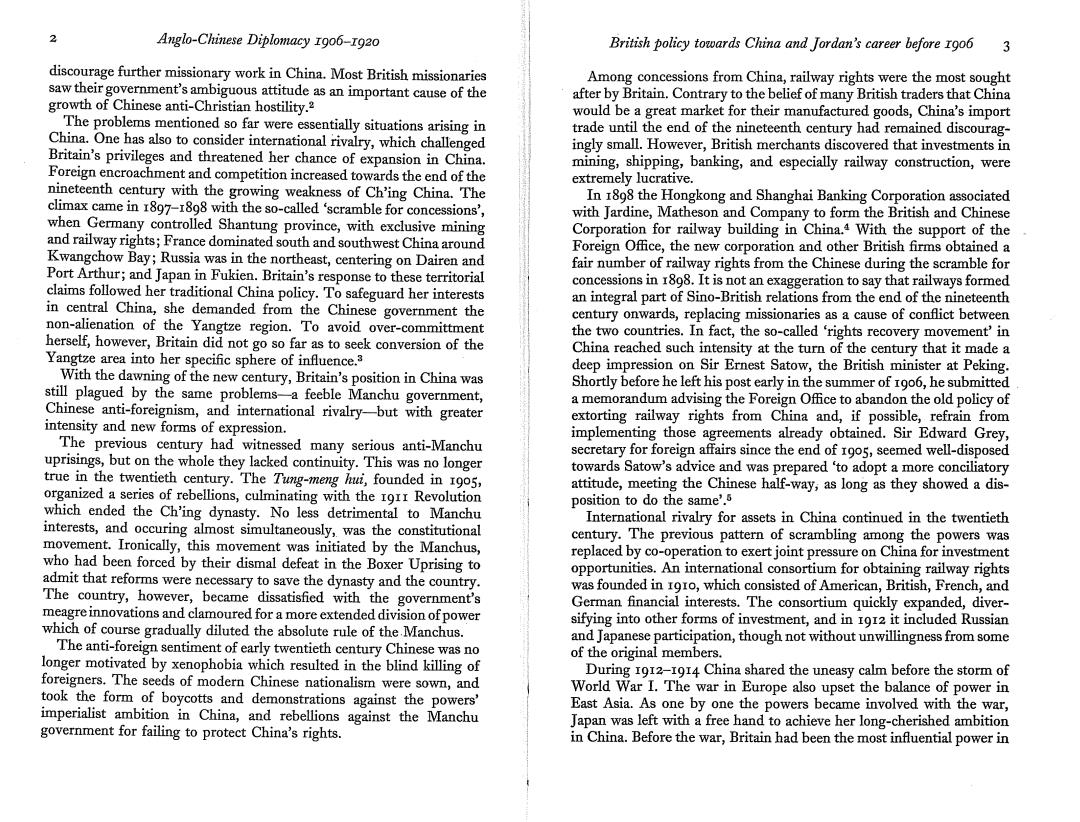正在加载图片...

2 Anglo-Chinese Diplomacy 1go6-I920 British policy towards China and fordan's career before 1go6 3 discourage further missionary work in China.Most British missionaries Among concessions from China,railway rights were the most sought saw their government's ambiguous attitude as an important cause of the after by Britain.Contrary to the belief of many British traders that China growth of Chinese anti-Christian hostility.2 would be a great market for their manufactured goods,China's import The problems mentioned so far were essentially situations arising in trade until the end of the nineteenth century had remained discourag- China.One has also to consider international rivalry,which challenged ingly small.However,British merchants discovered that investments in Britain's privileges and threatened her chance of expansion in China. mining,shipping,banking,and especially railway construction,were Foreign encroachment and competition increased towards the end of the extremely lucrative. nineteenth century with the growing weakness of Ch'ing China.The climax came in 1897-1898 with the so-called 'scramble for concessions', In 1898 the Hongkong and Shanghai Banking Corporation associated when Germany controlled Shantung province,with exclusive mining with Jardine,Matheson and Company to form the British and Chinese Corporation for railway building in China.4 With the support of the and railway rights;France dominated south and southwest China around Foreign Office,the new corporation and other British firms obtained a Kwangchow Bay;Russia was in the northeast,centering on Dairen and fair number of railway rights from the Chinese during the scramble for Port Arthur;and Japan in Fukien.Britain's response to these territorial claims followed her traditional China policy.To safeguard her interests concessions in 1898.It is not an exaggeration to say that railways formed an integral part of Sino-British relations from the end of the nineteenth in central China,she demanded from the Chinese government the century onwards,replacing missionaries as a cause of conflict between non-alienation of the Yangtze region.To avoid over-committment the two countries.In fact,the so-called 'rights recovery movement'in herself,however,Britain did not go so far as to seek conversion of the Yangtze area into her specific sphere of influence.3 China reached such intensity at the turn of the century that it made a deep impression on Sir Ernest Satow,the British minister at Peking. With the dawning of the new century,Britain's position in China was still plagued by the same problems-a feeble Manchu government, Shortly before he left his post early in the summer of 1go6,he submitted a memorandum advising the Foreign Office to abandon the old policy of Chinese anti-foreignism,and international rivalry-but with greater extorting railway rights from China and,if possible,refrain from intensity and new forms of expression. The previous century had witnessed many serious anti-Manchu implementing those agreements already obtained.Sir Edward Grey, uprisings,but on the whole they lacked continuity.This was no longer secretary for foreign affairs since the end of rgo5,seemed well-disposed true in the twentieth century.The Tung-meng hui,founded in 19o5, towards Satow's advice and was prepared 'to adopt a more conciliatory attitude,meeting the Chinese half-way,as long as they showed a dis- organized a series of rebellions,culminating with the IoIr Revolution position to do the same'.5 which ended the Ch'ing dynasty.No less detrimental to Manchu International rivalry for assets in China continued in the twentieth interests,and occuring almost simultaneously,was the constitutional movement.Ironically,this movement was initiated by the Manchus, century.The previous pattern of scrambling among the powers was who had been forced by their dismal defeat in the Boxer Uprising to replaced by co-operation to exert joint pressure on China for investment admit that reforms were necessary to save the dynasty and the country. opportunities.An international consortium for obtaining railway rights was founded in Igro,which consisted of American,British,French,and The country,however,became dissatisfied with the government's German financial interests.The consortium quickly expanded,diver- meagre innovations and clamoured for a more extended division of power which of course gradually diluted the absolute rule of the Manchus. sifying into other forms of investment,and in IgI2 it included Russian The anti-foreign sentiment of early twentieth century Chinese was no and Japanese participation,though not without unwillingness from some of the original members. longer motivated by xenophobia which resulted in the blind killing of During I9I2-1914 China shared the uneasy calm before the storm of foreigners.The seeds of modern Chinese nationalism were sown,and World War I.The war in Europe also upset the balance of power in took the form of boycotts and demonstrations against the powers' imperialist ambition in China,and rebellions against the Manchu East Asia.As one by one the powers became involved with the war, government for failing to protect China's rights. Japan was left with a free hand to achieve her long-cherished ambition in China.Before the war,Britain had been the most influential power in